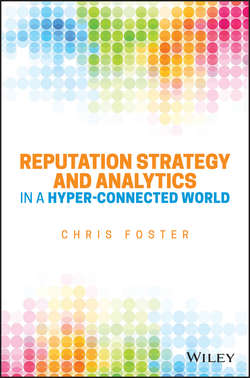Читать книгу Reputation Strategy and Analytics in a Hyper-Connected World - Foster Chris - Страница 5
На сайте Литреса книга снята с продажи.
Introduction
Brand Does Not Equal Reputation
ОглавлениеGreat companies discern the critical difference between brand and reputation. Let’s take a moment to examine this difference, because it is vitally important. As customers, our impression of a brand is usually formed by our direct experiences with a company’s products or services.
A company’s reputation, however, is formed by a collective belief system about quality or character. These beliefs are typically formed from hearing or reading the opinions of other people – friends, experts, and even total strangers – which today are relayed across an ever-widening array of media platforms and channels.
A good reputation:
● Creates trust in an organization’s products or services
● Provides access to policy and decision makers
● Attracts and retains the best employees
● Drives credibility with outside partners
● Serves as a critical success factor for investors
Indeed, the difference between brand and reputation is huge, and not yet fully appreciated. The management of a brand is a multidimensional function ranging from communications to product marketing. It involves complex and interrelated programs with often fuzzy mechanisms for measuring results or gleaning data that would improve future efforts. The reputation of a brand, on the other hand, is affected by additional factors that are independent of marketing-oriented brand management activities. Market conditions, CEO performance, and employee churn are all examples of variables that affect corporate reputation.
With that in mind, it’s fair to say that the reputation of a brand reflects a broad and fluid set of perceptions, beliefs, and expectations held by all of an organization’s stakeholders. It is the sum of their opinions, based largely on what they see, read, hear, and experience.
